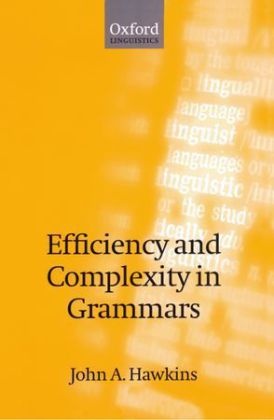Read more
Zusatztext Hawkins argues that grammars are profoundly affected by the way humans process language. He develops a simple but elegant theory of performance and grammar by drawing on concepts and data from generative grammar, linguistic typology, experimental psycholinguistics and historical linguistics. In so doing, he also makes a laudable attempt to bridge the schism between the two research traditions in linguistics, the formal and the functional. Efficiency and Complexity in Grammars is a major contribution with far-reaching consequences and implications for many of the fundamental issues in linguistic theory. This is a tremendous piece of scholarship that no linguist can afford to neglect. Informationen zum Autor John A. Hawkins completed his PhD at Cambridge University in 1975. He has held positions at the University of Essex, the Max-Planck-Institute for Psycholinguistics, and the University of Southern California. In 2003 he was elected to a chair at Cambridge. His visiting appointments include UCLA, Berkeley, Potsdam, and the Max-Planck-Institute for Evolutionary Anthropology. He has research interests in linguistics and cognitive science and has published books and articles on typology and universals, syntax and grammatical theory, and psycholinguistics and historical linguistics. Recently, his particular focus has been the relationship between principles of language use and grammars. His books include A Performance Theory of Order and Constituency (Cambridge, 1994); A Comparative Typology of English and German (Austin, 1986) Word Order Universals (New York, 1983), Definiteness, and Indefiniteness: A Study in Reference and Grammaticality Prediction (London, 1978). Klappentext John Hawkins demonstrates a clear link between how languages are used and the conventions of their grammars. He sets out a theory in which performance shapes grammars and accounts for the variation patterns found in the world's languages. He backs this up with evidence from a wide array of languages. He also considers the profound consequences of this correspondence for explanations of language change and evolution! and for models of performance and acquisition. His book is of fundamental importance for linguistic theory. Zusammenfassung Demonstrates a link between how languages are used and the conventions of their grammars. This book sets out a theory in which performance shapes grammars and accounts for the variation patterns found in the world's languages. It is of interest to researchers in linguistics, psycholinguistics, computational linguistics and cognitive science. Inhaltsverzeichnis 1: Introduction 2: Linguistics Forms, Properties and Efficient Signaling 3: Defining the Efficiency Principles and their Predictions 4: More on Form Minimization 5: Adjacency Effects Within Phrases 6: Minimal Forms in complements/Adjuncts and Proximity 7: Relative Clause and Wh-movement Universals 8: Symmetries, Asymmetric Dependencies and Earliness Effects 9: Conclusions Abbreviations References Index of Authors Index of Languages Subject Index ...

